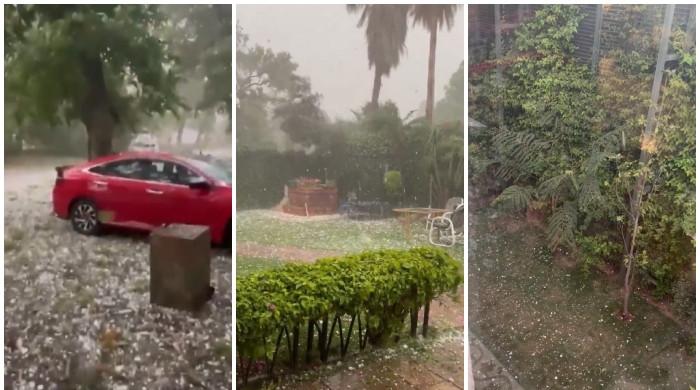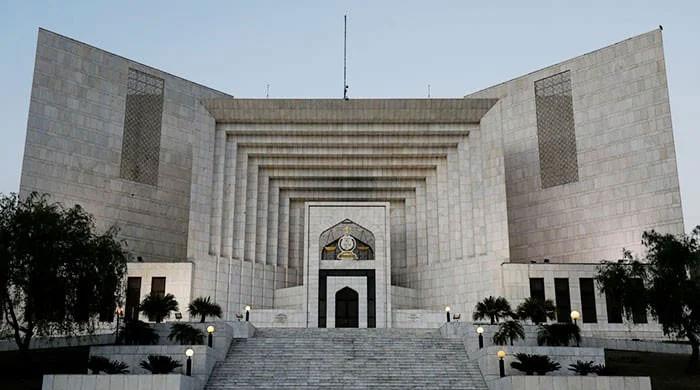Muharram sabeels: Quenching the thirst of generations of faithfuls
These coolers, sprinkled with chopped nuts and often dashed with 'tukhme balanga', are a refreshing treat for the mourners who willingly accept it to quench their thirst
September 30, 2017
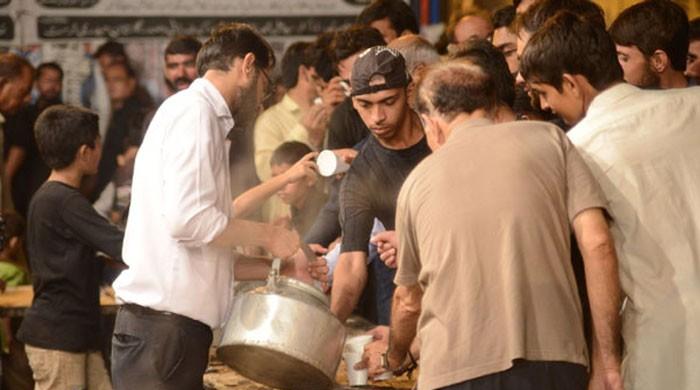
The first 10 days of Muharram are a busy time for Nasir Ali and his friends, who run pillar to post working tirelessly to give picture-perfect touches to their beloved project—a thriving Sabeel in Karachi's bustling neighborhood Soldier Bazaar.
Apparently, it's a modest setup: few tables lined up on the footpath adjacent to Mehfil-e-Shahe Khorasan and covered with yards of plain black sheets, tents wrapped around to provide makeshift walls and ceiling, a couple of heavy duty energy savers and you have a temporary oasis running.
But Nasir and company rejoice in the fact that their small effort serves a big cause. "We set up this Sabeel remembering the thirst of Imam Hussain and for serving humanity. Imam Hussain and his followers didn't get water, but we want to make sure that no one goes thirsty at least in these 10 days."
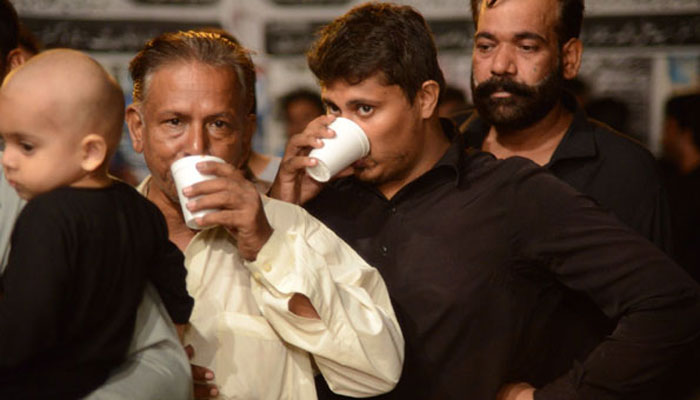
This indeed is a task easier said than done, but for this group of dedicated friends, this is one mission they strive every yard to accomplish. Their activities start at seven in the evening and stretch to as late as midnight.
For the past 10 years, little has changed in their Muharram routine. For 10 days in running they offer milk-based chilled sherbets (sweet drinks) to the mourners. The mix is often interesting and the taste, always heavenly.
"Each day we try to make something different, the RoohAfza-based milk sherbet is an all time favorite. Then we have the almond, banana, mango pulp and Lassi. Today we are mixing ice-cream soda in milk. I am sure people will love it."
With the sultry and humid weather of Karachi scaling to legendary heights, these coolers, sprinkled with chopped nuts and often dashed with 'tukhme balanga', are a refreshing treat for the mourners who willingly accept it to quench their thirst. Not to mention that this demand keeps skyrocketing.
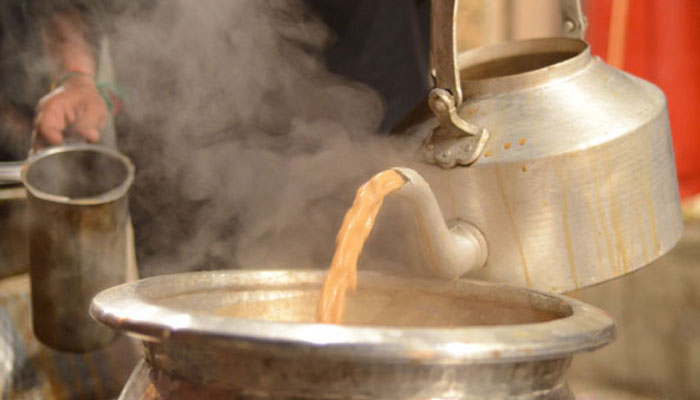
"We start off with making around 80 liters of sherbet in the first 2-3 days, but as we get close to Ashur and more and more people start visiting our Sabeel, this quantity gradually grows up to 240-260 liters per day."
When questioned about the quality of milk, water and ingredients used, Sohail Abbas, another member of the team, was quick to point out that only the finest of items are used. "We buy boiled milk from whole sale market and use distilled water to make our sherbet. The same goes for the dry fruits. I have my own kids drinking from the Sabeel, we will never use low quality stuff.”
The cost of running this 10-day devotion comes close to a million rupees all pooled in by the friends themselves. As the Majlis comes to an end, scores of mourners line up, waiting calmly for their turn. Unlike the misadventures seen in political events, sanity prevails all around.
"The crowds are always well behaved and harmony is at its peak. Shias, Sunnis all come to drink from the Sabeel and for us this is a great way to promote harmony in these tumultuous times. "
It's never too hot for a cup of tea
Unbelievable, but it's true, you can never take away the love of a well brewed cup of tea form a genuine Karachitte. 65-year-old Mustafa Bahadur Ali understands this chemistry well. No wonder, then, that his distinct offering, the refreshing cardamom tea, is in popular demand.
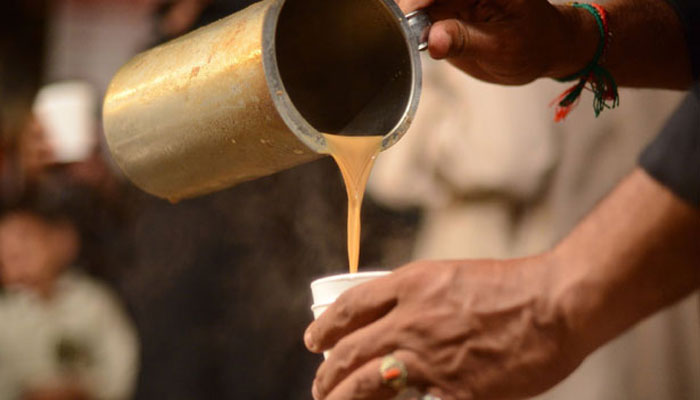
Situated at the corner of Aza Khana-E- Zehra in Soldier bazaar, the Chai Sabeel has been running nonstop for the last 39 years and the tradition has been passed on to the 3rd generation.
"My father started this Sabeel 39 years ago when Mr. Ahmed gave up his home for Aza Khana-E- Zehra. My father decided to serve tea. He passed on the tradition to me and now it's my kids who are shouldering the responsibility."
As Mustafa Bahadur Ali recalls, a lot has changed in the last 39 years, not to forget the economics of the common man's beloved drink. "Back in those days, the entire cost for a day's offering was Rs 60 and it included everything. Today prices have gone so high that we find it hard to make an accurate estimate, but that doesn't keep us away from serving the mourners."
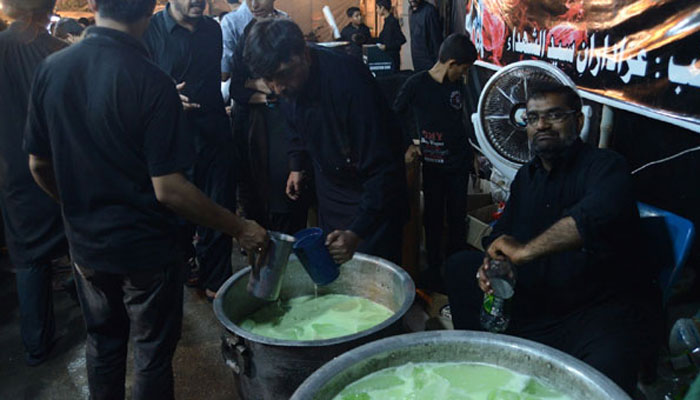
Mustafa’s 38-year-old-son Yaseen is the man holding things together. "We start making tea around 7 and it's ready by 9.30. We use up to 30 kilos of tea and coffee and around 150 kilos of sugar during the Ashur days. We use powdered milk and cardamom as it gives our tea a very unique and refreshing taste."
Just like the Sherbet Sabeels, the tea offering starts with 2 Daighs (cauldrons) and ends up with three close to Ashur, offering approximately 160 to 180 liters of tea to the faithful each day.
"We take great pride in serving the Azadars, it is a source of satisfaction that we are part of a good cause. Our entire family — kids, women and everyone — chips in to help. Manpower is never an issue. In fact, we often have to excuse people."
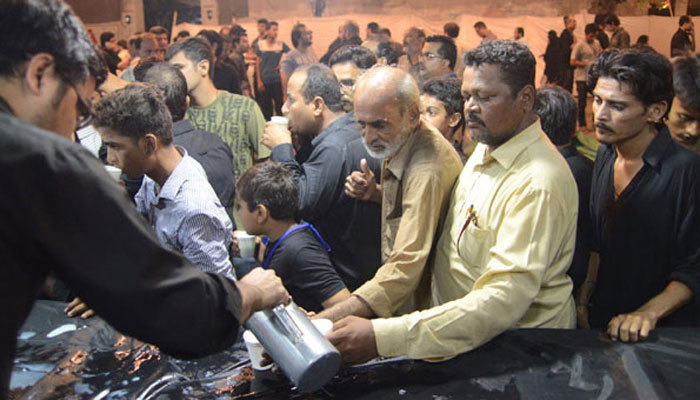
Just like Soldier Bazaar, the early days of Muharram sees Sabeels springing up in almost all neighbourhoods of Karachi with both Shias and Sunnis harbouring the centuries-old tradition.
With the operational cost of running these Sabeels often running into millions, their purpose, however, remains the same. Karachittes, in this way, not only relive the sacrifices rendered by Imam Hussain (R.A.) and his companions, but also showcase their resilience towards religious intolerance and extremism.
This article was originally published in October 2015
—The writer tweets @AsharZaidiGeo







